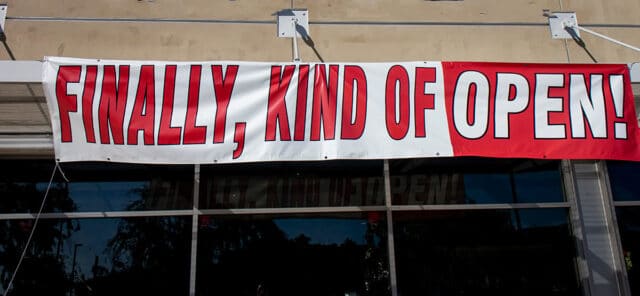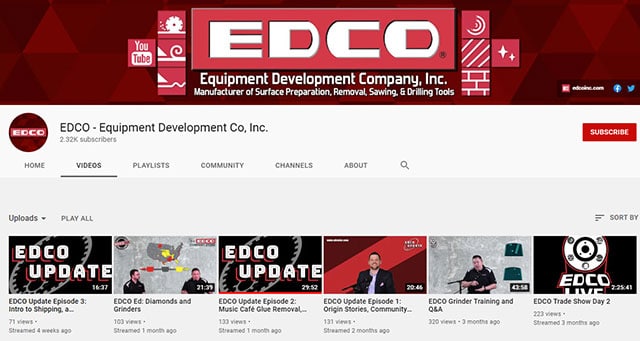
It’s been an interesting year or so. B2B companies have had to constantly update and reassess their marketing and sales strategies. But if I hear the word PIVOT one more time, I’m gonna lose it.

Now that the CDC has announced people who are vaccinated can forego wearing a mask in public, there is this feeling that life is slowly returning to some new version of normal.
But COVID will have a lasting impact on how we do business in this country. For example…
- Hybrid workforces will become the new normal
- Zoom meetings are here to stay
- eCommerce is more important than ever
- Empathy is now a part of our business conversation
- Business location is less important than it once was
In other words, the cat is out of the bag. We have proven that we can work well from home, we can do business via Zoom, and you can buy ANYTHING online. But that last one is the most important lesson, I believe.
So, what does this mean for B2B companies and their digital marketing efforts? There are three main points I want to cover here…
- Embrace our digital-first economy with empathy
- Be open to new collaborations and ways of doing business
- Stop selling and start empowering
Let’s look at each of these a little further…
Embrace Our Digital-First Economy with Empathy
We’ve all been stuck at home and stressed out for the last 40 years, I mean 12+ months. We all want to get out and mingle, well some of us at least. But that doesn’t change the fact that we’ve learned much of the business we engage in can be done remotely.
Perhaps now more than ever we understand the importance of knowing your audience, knowing their needs. However, because of the hit many businesses took during this global pandemic and ultimate recession, the focus quickly shifted to the “quick win.”
I get it, we all have bottom lines we need to worry about, but I worry about short-sighted goals overshadowing long-term ones. Let’s not throw the baby out with the bathwater.

We cannot forget about long-term gains won through empathetic, customer-centric marketing. What do I mean?
Customer-Centric Content Marketing
In a Gallup study, it was found that “Only 31% of B2B customers believe their supplier understands their needs, and only half of B2B customers (54%) strongly agree that their sales or account teams are trusted advisers.”
When was the last time you talked to your clients about their wants and needs? Recently? Great! Not so recently and/or never? Why? These are people, not just “consumers.” They have their own set of problems they must deal with every day.
Why are we then creating more noise with our content marketing efforts that simply makes their jobs harder? Have you ever read an article on a vendor’s website only to get to the end and wonder “what was the point of that?” Or even worse, like Ralphie in Christmas Story…

Write content that makes their job easier. Create a variety of content they can use in a variety of ways…
- Case studies that show them how to use you to solve their problems
- Webinars and video content that educates and empowers
- Expert interviews that offer unique insight they can use to do their job
- Blog posts with a real and applicable lesson (like this one, I hope)
Yes, SEO, conversion, digital marketing goals, reach, and all the rest still matter when it comes to creating marketing content. But I will continue to argue that the client’s needs should always top that list. Now more than ever!
This requires a longer-term, more strategic approach to your digital marketing.
Be a Customer Experience Super Hero

Let’s run with this theme a little further before we move on to the second two points of this post. We get so focused on “moving the needle” and “ROI” and all the metrics that we forget we’re still talking to actual people.
Some of the most passionate brand advocates are that way because a brand helped them solve their problems. No customer is going to shout your greatness from the rooftops because you gave them the best price. And they won’t go out of their way to recommend your products or services because you shipped on time or delivered what was “in scope” or even a little extra.
No, what gets them excited is when you helped them to alleviate and/or eliminate a problem or frustration in their jobs. Some of the best brands out there understand this and build on it.
The B2B business world is often one with complex solutions to difficult problems. The best B2B brands out there are the ones who focus on the customer experience first and the products second.
Use Digital Marketing to Improve the Customer Experience, No Really
Part of that customer experience is making sure that your customers are equipped with everything they need to use your solution to solve their problems.
Create marketing, like the things mentioned above, that trains your customers and future customers on how to work with you, your products, and services to maximize their return on investment, investment in time, money, and effort.
And I’m not just talking about great content, I’m talking about being there all the time. Use tools that make their lives easier…
- Social media so they can find you and your content whenever and wherever they need it
- Consistent messaging so they come to rely on you and come to expect regular awesomeness from your marketing
- Marketing automation to make sure they don’t miss you and you don’t miss them
- An accessible and easy-to-use website
Be so consistent, present, and awesome such that your customers think of you like a superhero who just seems to always show up in their time of need.
Stop Thinking of Them as B2B Buyers, They Are People
I recently interviewed one of my friends, Amber Naslund, who is the Principal Content Consultant at LinkedIn. We talked (vented) about boring B2B content and why businesses cannot grasp the concept that they are selling to human beings.
I love what Amber says here…
“The people who are actually buying stuff from businesses are still humans, who are messy, complicated multitasking people. So even while they’re in the mindset of making a business decision, they are simultaneously in the back of their head thinking about their kid’s piano recital, and you know, they’re out of Pringles at home, and they better stop at the store. We do those things simultaneously.” Amber Naslund, Principal Content Consultant for LinkedIn
We have this notion that when our customers are researching solutions like ours, they suddenly transform into this corporate buying machine that wants nothing but jargon, features/benefits, and all that other boring stuff.
No, they want to know that you understand their needs. They want to know that you will work with them to help them solve their problems. They’re looking for vendors who understand them and who will make their lives easier.
This is what I mean by embracing digital-first with empathy. You can use technology but it all needs to be based on the idea that you are committed to being the hero your clients need.
I use this my daughter’s drawing all the time in posts. Two reasons: one, I’m a proud daddy, two, it sums my point up perfectly…

Be human, even with technology. Create digital marketing that is rooted in your humanity, is true to your core values, and empowers your customers. But remember, you cannot do it all alone.
Be Open to New Collaborations and Ways of Doing Business
One of my favorite discoveries from the past year is Lunchclub. This is a free service where you can meet with people in certain industries in various cities.
Great, another damn Zoom meeting! I know, I know. But the connections I’ve made using this service have been incredible. I’ve discovered new technologies, discussed different ways of doing things, and uncovered business opportunities I think I would have missed.
And I am having human-to-human conversations with real people I would have probably never met otherwise. I just had a meeting with Geoff DiMasi from Philadelphia and we spent 1/3 of the time talking about our mutual love and admiration for Fugazi and Dischord Records (it’s a DC thing, but a great example of the type of company I’m talking about).
Co-Opetition – Competitors Are Opportunities
Anyway, I remember when I started my previous company, it was in 2002. We were still in the aftermath of a post-911 world and the effects of the dot-com bust. Lots of larger agencies had fallen by the wayside.
At that time, partnering was the norm. It was rare that any agency would be able to do everything in-house. We had a term for it, “co-opetition.” Probably not the correct spelling if there is such a thing.
Anyway, my point with Lunchclub and co-opetition (it’s cooperation and competition for those who are slow like me), is that we are once again in a recession. We also are in the aftermath of a different tragedy, a slower and more deadly one. Many businesses have shrunk or shuttered.
I have had so many meetings with smaller companies over the past few months where partnering was almost always a topic of discussion. And clients are open to this sort of thing more and more, especially now.
They don’t necessarily care that you cannot do it all in-house and that you’re working with other companies to provide them with the solution they need. They just want to know that it will be managed properly and they will be pleased with the outcome.
Co-Branding and Co-Marketing for the Win!
The other benefit to partnerships is the marketing opportunities it opens up for you. You’ve now expanded your pool of experts and can better serve your clients with content that goes beyond what you could otherwise offer.
For example, co-marketing opportunities could present themselves as…
- A co-branded webinar or in-person seminar series
- Guest posts on each other’s websites
- A packaged offering that brings together the best of both companies for a new and better solution in your industry
- Expanded email marketing opportunities
- Sponsorships and community-related efforts
And the list goes on. There’s strength in numbers. Just be careful. The goal here is not to take advantage or be taken advantage of. Make sure that these partnerships are mutually beneficial and are set up to protect everyone involved.
There’s nothing worse than a partnership gone bad.

Now, let’s talk about sales…
Stop Selling and Start Empowering
My final point here might seem rather obvious at this point, but the urge to “sell” is so strong in B2B marketing that the messaging created ends up being all about how great the company is, and no one wants that.
At Wellspring Digital, we can give you a commercial about how great we are, but we’d rather show you. And we want to have conversations with you instead of just take orders.
Some might call this “consulting” which is an appropriate word, I guess. But I prefer community building. One thing we’ve learned in this pandemic is the power of community.
The most celebrated businesses of late are the ones who have shown their humanity and that they truly care about their customers. This is a tough lesson for many in the B2B world who are worried about growth, market share, and the bottom line.
But here’s the thing, these things are not mutually exclusive, especially today. Here at Wellspring, we tend to look at things in the longer term. Sure, we could sign you up as an SEO client for 6 months and provide results. But we’d rather work with you in a more strategic fashion such that we’re implementing digital marketing tactics that make sense in the short and long terms.
This might cost us money upfront but in the long term we’ve built a solid relationship with our clients, that’s more like a partnership and less like a vendor/buyer relationship.
What If The Return on Investment Was Long-Term?
What I’m talking about here is community. You’re building a foundation for something more meaningful, to you and your customers. When you build a community with your marketing, you open yourself up to other opportunities…
- A consistent source of support: they share your stuff, they give you great reviews, and they have your back in tough times
- A steady stream of word of mouth referrals on social media also supports your online reputation
- Customer-focused content opportunities like case studies and testimonials that feel genuine and actually convince a buyer on the fence
- Repeat business because they believe in you and genuinely want to see you succeed
Creating a community using digital marketing can look like this…
- A community forum or user group for customers who can help each other
- Blog posts, videos, podcasts that include users, customers, or partner companies
- Messaging that speaks to the needs of the customers instead of the benefits of your products or services
EDCO and the Grinder Community

One of my favorite examples of this is from a company called EDCO. They manufacture, sell, and support commercial concrete grinders and related tools. Sounds exciting, right? No, not really.
But they make it exciting. First, and this is important, they make outstanding products. If you’re selling junk, I cannot help you. You have bigger problems marketing alone cannot solve.
Something tells me that if you’ve made it this far in this rather long post, this isn’t you. So, back to EDCO and then I’ll wrap this sucker up.
Jason Stanczyk, VP of Operations at EDCO, and his team have completely transformed their marketing and customer service efforts. They now embrace technology as a way to better serve and support the EDCO user community.
This is Google E-A-T for a B2B manufacturer. Normally, when we think of E-A-T, we think of academics and other accredited experts, but it very much applies here. E-A-T stands for expertise, authoritativeness, and trustworthiness. This is what EDCO is all about.
Here’s how they put it on their website in a section titled “What keeps us up at night”…
Everyone at EDCO understands we don’t exist without our customers. EDCO and EDCO Fabrication customers deserve safe, long-lasting products and our help making them successful. We make sure all questions are answered. Some companies just say they answer all inquiries, we actually do. Test us! – ECDO
They do this with an outstanding customer support team, but it doesn’t stop there. They’ve invested heavily in video marketing (this video actually features my cousin which I just realized, small world), podcasting, and developing better online tools to make the user experience outstanding.
This is an example of digital marketing that isn’t relegated to a silo within the company but as another way to empower their customers and build a community of fans. THIS is what I’m talking about!
What keeps you up at night?